英语翻译chapter 3
- 格式:ppt
- 大小:100.00 KB
- 文档页数:22
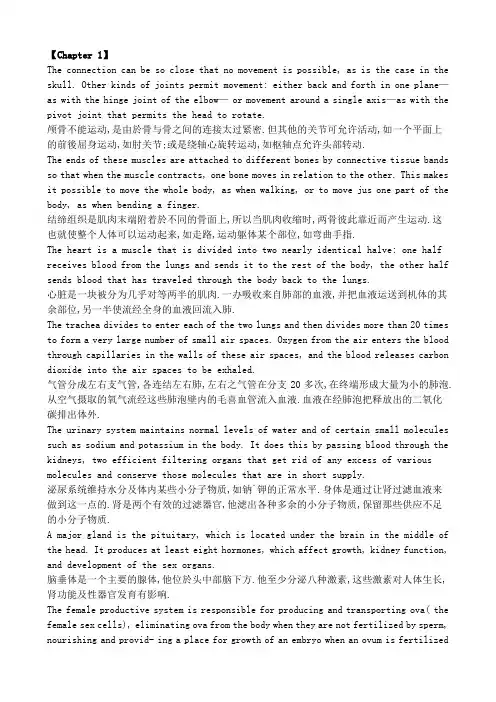
【Chapter 1】The connection can be so close that no movement is possible, as is the case in the skull. Other kinds of joints permit movement: either back and forth in one plane—as with the hinge joint of the elbow— or movement around a single axis—as with the pivot joint that permits the head to rotate.颅骨不能运动,是由於骨与骨之间的连接太过紧密.但其他的关节可允许活动,如一个平面上的前後屈身运动,如肘关节;或是绕轴心旋转运动,如枢轴点允许头部转动.The ends of these muscles are attached to different bones by connective tissue bands so that when the muscle contracts, one bone moves in relation to the other. This makes it possible to move the whole body, as when walking, or to move jus one part of the body, as when bending a finger.结缔组织是肌肉末端附着於不同的骨面上,所以当肌肉收缩时,两骨彼此靠近而产生运动.这也就使整个人体可以运动起来,如走路,运动躯体某个部位,如弯曲手指.The heart is a muscle that is divided into two nearly identical halve: one half receives blood from the lungs and sends it to the rest of the body, the other half sends blood that has traveled through the body back to the lungs.心脏是一块被分为几乎对等两半的肌肉.一办吸收来自肺部的血液,并把血液运送到机体的其余部位,另一半使流经全身的血液回流入肺.The trachea divides to enter each of the two lungs and then divides more than 20 times to form a very large number of small air spaces. Oxygen from the air enters the blood through capillaries in the walls of these air spaces, and the blood releases carbon dioxide into the air spaces to be exhaled.气管分成左右支气管,各连结左右肺,左右之气管在分支20多次,在终端形成大量为小的肺泡.从空气摄取的氧气流经这些肺泡壁内的毛喜血管流入血液.血液在经肺泡把释放出的二氧化碳排出体外.The urinary system maintains normal levels of water and of certain small molecules such as sodium and potassium in the body. It does this by passing blood through the kidneys, two efficient filtering organs that get rid of any excess of various molecules and conserve those molecules that are in short supply.泌尿系统维持水分及体内某些小分子物质,如钠`钾的正常水平.身体是通过让肾过滤血液来做到这一点的.肾是两个有效的过滤器官,他滤出各种多余的小分子物质,保留那些供应不足的小分子物质.A major gland is the pituitary, which is located under the brain in the middle of the head. It produces at least eight hormones, which affect growth, kidney function, and development of the sex organs.脑垂体是一个主要的腺体,他位於头中部脑下方.他至少分泌八种激素,这些激素对人体生长,肾功能及性器官发育有影响.The female productive system is responsible for producing and transporting ova( the female sex cells), eliminating ova from the body when they are not fertilized by sperm, nourishing and provid- ing a place for growth of an embryo when an ovum is fertilizedby sperm, and nourishing a newborn child.女性生殖系统产生,输送卵子(女性性细胞),将未受精的卵子排出体外,而当精,卵结合时,女性生殖系统培养,提供胚胎生长场所,并孕育新生儿.【Chapter 2】A symptom is something a patient can de-tect, such as fever, bleeding, or pain. A sign is something a doctor can detect, such as a swollen blood vessel or an enlarged internal body organ.症状是病人自己就能察觉到的,比如,高烧,流血,或是疼痛.而徵兆则是医生所能够观察到的,比如,血管扩张或是体内器官肿大.The skin and mucous membranes covering the body or lining its openings offer considerable resis-tance to invasion by bacteria and other infectious organisms. If these physical barriers are injured or burned, infection resistance drops. In minor cases, only boils or pimples may develop. In major cases, however m large areas of the body might become infected.覆盖在体表或者器官开口处的皮肤和黏膜能在很大程度上抵抗细菌或其他感染体的入侵.如果这些屏障遭到了损坏或损伤,身体对感染的抵抗力就会下降.在一些病情较轻的病例中,疥子和小脓胞可能会发生.在病情较重的病例中,身体的大面积区域则可能会被感染.Breathing passages are especially vulnerable to infection. Fortunately, they are lined with mu-cus-secreting cells that trap tiny organisms and dust particles. Also, minute hairs called cilia line the breathing passages, wave like a field of wheat, and gently sweep matter out of the respiratory tract.呼吸通道尤其容易受到感染,幸运的是,呼吸道内附盖满了能分泌黏液的细胞,他们能捕捉微小的有机体和尘粒.另外,被叫做纤毛的细小毛发也覆盖了呼吸道,他们像微风下麦田里的小麦一样舞动着,轻轻地将异物扫出呼吸道.In addition, foreign mater in the breathing passages can often be ejected by nose blowing, coughing, sneezing, and throat clearing.除此之外,呼吸道内的异物还常常因为擤鼻涕`咳嗽`打喷嚏和清喉咙而被弹出.Unless the abscess breaks and allows the pus to drain, the infection is likely to spread.如果脓块不破裂,里面的脓不排除掉,感染很可能会扩大.1.Each antibody is made of a heavy chain of chemical subunits, or amino acids, anda light chain of them. The light chain has special sites where the amino acidscan link with their com-plements on the antigen molecule.每一个抗体由一条化学亚单位(及氨基酸)的重链和一条轻链所构成.这条轻链上有特别的部位,在那里,氨基酸能使其补体和抗原分子相连.2.In some cases, through the process of opsonization, antibodies “butter” thesurface of some antigens and make them “tastier” to phagocytes, which engulf the antigens.在某些情况下,通过调理素作用的过程,抗体在抗原表面涂抹上一些”奶油”,让吞噬细胞更喜欢吞噬他们.3.Sometimes an antibody hooks to bacterial antigen but needs an intermediate, orcomplement, to actually destroy the bacterium, As the antibody-antigen complex circulates in the blood, the complex “fixes” complement to it.在另一些情况下,抗体和一个细菌抗原合上以後,却需要一个中间体,或补体来实施对该细菌的消灭.於是,当抗体和抗原的结合体随血液循环时,该结合体会有一个补体附体.4.During the first day or so , antibodies against the infection cannot be found inthe blood. But this is only because the basic cells involved in antibody production have been triggered by the presence of antigen to multiply themselves.在第一天左右,血液中没有发现对付传染病的抗体,但是,这只是因为涉及抗体制造的基本细胞已被当前的抗原存在所触发而准备开始繁殖.【Chapter 3】The fleshy belly is attached to one bone while the tendon passes over a joint to become firmly attached to the adjoining bone.肌腱跨过关节牢固连接相邻的两块骨头,而腹肌则与骨头紧密相接.Shortening of the fleshy part of the muscle produces movement at the joint by pulling on the tendon. The tendon itself does not change in length.腹肌收缩拉动肌腱使关节运动,而肌腱本身的长度是不变的.The many bundles surrounded by the fibrous connective tissue fascia form the fleshy belly of the muscle.许多纤维束又被纤维结缔组织筋膜所包绕,最後形成肌肉的肌腹部份.The relation of the muscle bundles to the tendons is that the muscle bundles ate surrounded and held together by the fibrous connective tissue that is continuous with the fibrous connective tissue of the tendonous part of the muscle.肌束和肌腱之间的关系是:肌束被纤维结缔组织包绕并连接在一起,纤维结缔组织又与肌键部份的结缔组织相延续.The nerve fibers separate within a muscle with a terminal branch of the nerve going to each muscle fiber.在一块肌肉中神经纤维可分枝出许多神经末梢,分配到每块肌纤维中.【Chapter 4】Flat bones are generally thin and composed of two more or less parallel plates of compact bone enclosing a layer of spongy bone.扁骨一般较薄,由两层大致平行的骨密质骨板围绕一层松质骨构成.Bones undergoing either intramembranous or endochondral ossification are continually remodeled from he time that initial calcification occurs until the final structure appears.自最初的钙化发生开始,骨通过膜内骨化或软骨内骨化而不断地得以重塑,直至最後结构的形成.And still others, espe-cially the sex hormones, aid osteoblastic activity and thuspromote the growth of new bone. The sex hormones act as a double-edged sword. They aid in the growth of new bone, but they also bring about the degeneration of all the cartilage cells in epiphyseal plates.还有其他激素,特别是性激素,协助成骨细胞活动因而促进骨生长.性激素作用具有两面性,他能促进骨生长,但也使骺板所有软骨细胞退化.There are two principal effects of aging on the skeletal sys-tem. The first effect is the loss of calcium from bones.衰老对骨骼系统有两个主要作用.第一个作用是骨钙丧失.The second principal effect of aging on the skeletal system is a decrease in the rate of protein formation that results in a decreased ability to produce the organic portion of bone matrix.衰老对骨骼系统的第二个主要影响,是蛋白质合成速度降低至使产生骨基质的有机成分的能力下降.【Chapter 5】The cardiac sphincter relaxes and contracts to move food from the esophagus into the stomach, whereas the py-loric sphincter allows food to leave the stomach when it has sufficiently digested.贲门括约肌的舒张与收缩使食物由食管入胃,而幽门括约肌却使食物在充分消化後出胃. These substances help transform food present in the stomach into a semifluid substance called chime. The pyloric sphincter allows food to pass into the small intestine only after it has been transformed into chime.这些物质(盐酸)协助将胃内现存的食物转变成为称为食糜的半流质物质.幽门括约肌只有在食物完全变为食糜後才将其排入小肠.【Chapter 6】Air enters the body through the nose and passes through the nasal cavity, which is lined with a mucous membrane and fine hairs(cilia) to help filter out foreign bodies, as well as to warm and moisten the air.空气通过鼻进入人体内.在通过鼻腔时,其内排列的黏膜和纤毛过滤了异物,同时使进入的空气温暖而湿润Paranasal sinuses are hollow, air-containing spaces within the skull that communi-cate with the nasal cavity.副鼻窦位於头颅骨内,中空含气,并与鼻腔相通.They, too, have a mucous membrane lining and function to provide the lubricating fluid mucus, as well as to lighten the bones of the skull and help produce sound.副鼻窦也有黏膜衬里,其功能是提供润滑黏液,减轻头颅骨负荷,以及协同发声.It is in the hypopharyngeal region that the pharynx, serving as a common passageway for food from the mouth and air from the nose, divides into two branches, the larynx(voice box) and the esopha-gus.下咽部是来自於嘴的食物和来自鼻的空气之共同通道,他在这里又分为两支,喉(声音盒)和食管.A special deterrent to this event is provided for by a flap of cartilage attached the root of the tongue that acts like a lid over the larynx.这一起着特殊阻滞作用的物体是一层连着舌根的软骨结构,它像块盖子盖过喉.The measure of how easily the lungs expand under pressure is compliance.肺器之所以能在压力下轻松自如地展开,其方法就是因势利导,顺其自然.Breathing is regulated unconsciously by center in the brainstem. These centers adjust the rate and rhythm of breathing according o changes in the composition of the blood, especially the concen-tration of carbon dioxide.脑干里呼吸中心在不知不觉中控制和调节了呼吸.这些中心根据血液里的成分,特别是二氧化碳的浓度来调节呼吸的速率和节奏.If too much carbon dioxide is exhaled by hyper-ventilation, body fluids tend to become more alkaline, a condition termed alkalosis. If too little car-bon dioxide is exhaled as a result of hypoventilation, body fluids tend to become more acid, a condi-tion termed acidosis.如果因为换气过度而二氧化碳呼出过多,身体体液就容易变的偏硷性,一种被称为硷中毒的状态.然而,如果由於换气不足,二氧化碳呼出过少,身体体液就容易变的偏酸性,一种被称为酸中毒的状态.Lining the trachea and bronchial tree are cells that secrete mucus, which traps pollutants and bacteria. Also in the bronchi are cells containing tiny cilia, that project into the blanket of mucus and with constant wavelike motions push the mucus up out of the airways.第一,气管和支气管树铺满能分泌黏液的细胞,它们能捕捉污染物质和细菌.第二,支气管里还有长有细小纤毛的细胞,它们深入遍布的黏液层,不停地通过波浪般的动作把黏液向上清扫出呼吸道.【Chapter 7】There are three major types of blood vessels, . , veins, and capillaries.血管分为三大类,即动脉、静脉、毛细血管The largest artery, the aorta, is about 1 inch in diameter and has the thickest wall.主动脉是最大的动脉,管腔直径约为1英寸,血管壁最厚The capillary boundaries are the most important center of activity of the entire circulatory system.毛细血管网是整各循环系统的最重要活动中心Most veins are equipped with one-way valves that permit the blood to flow in only one direction.They are most numerous in the veins of the extremities.大多数静脉具有单向瓣膜,使血液朝着一个方向流动.在四肢的静脉中,这样的瓣膜最多The pulmonary arteries carry blood low in oxygen from the right ventricle, while the pulmonary veins carry blood high in oxygen from the lungs into the left atrium.肺动脉携带右心室出来的、含氧量低的血液;而肺静脉将含氧量高的血液从肺携带到左心房Blood returning from tissues other than the lungs enters the heart by way of the venae cavae: the superior vena cava and the inferior vena cava.从组织(肺组织除外)而来的血液经腔静脉,即上腔静脉与下腔静脉,回到心脏When the atria contract, blood in the right atrium is forced through the tricuspid valve into the right ventricle.当心房收缩时,右心房的血液则通过三尖瓣进入右心室Atrial contractions force blood from the left atrium through the mitral valve, also called bicuspid valve, into the left ventricle.心房收缩将血液从左心房挤压通过二尖瓣,进入左心室When the ventricles contract, blood in the left ventricle is forced through the aortic semilunar valve into the aorta, the body’s largest artery, for distribution to the tissues.当心室收缩时,左心室的血液被挤压通过主动脉瓣,进入主动脉(机体内的最大动脉),然後分配到机体的各个组织【Chapter 8】Oxygen from the lungs and nutrients from the digestive tract are absorbed into blood for transport to the tissues.血液吸收肺部来的氧和消化道来的营养物质,并输送到组织At the same time, carbon dioxide and other waste products of cellular metabolism are absorbed from the tissues for transport to the organs of elimination.同时,组织的细胞代谢产生的二氧化碳和其他废物,送到排泄器官The blood also transports hormones from endocrine glands to their target organs.血液还将内分泌腺产生的激素输送到它们的靶器官。
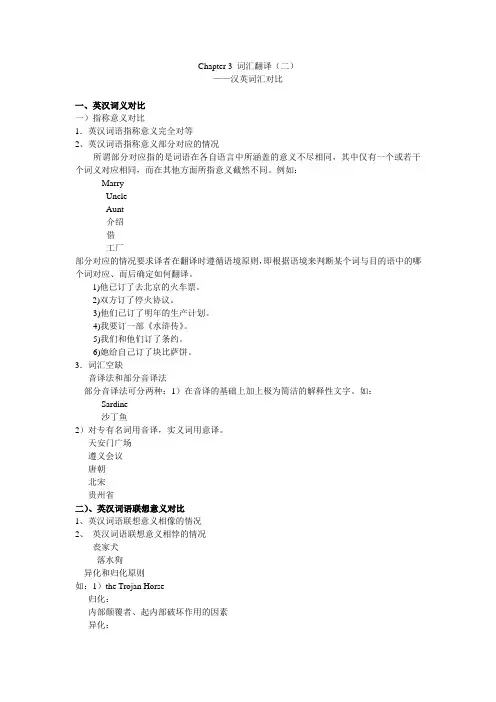

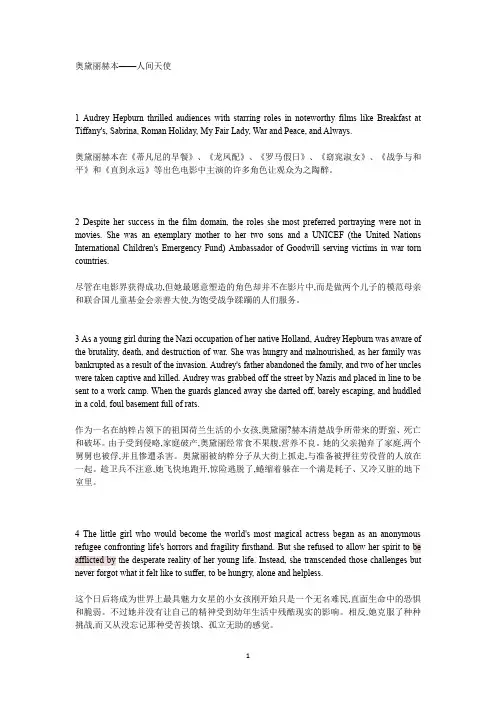
奥黛丽赫本——人间天使1 Audrey Hepburn thrilled audiences with starring roles in noteworthy films like Breakfast at Tiffany's, Sabrina, Roman Holiday, My Fair Lady, War and Peace, and Always.奥黛丽赫本在《蒂凡尼的早餐》、《龙凤配》、《罗马假日》、《窈窕淑女》、《战争与和平》和《直到永远》等出色电影中主演的许多角色让观众为之陶醉。
2 Despite her success in the film domain, the roles she most preferred portraying were not in movies. She was an exemplary mother to her two sons and a UNICEF (the United Nations International Children's Emergency Fund) Ambassador of Goodwill serving victims in war-torn countries.尽管在电影界获得成功,但她最愿意塑造的角色却并不在影片中,而是做两个儿子的模范母亲和联合国儿童基金会亲善大使,为饱受战争蹂躏的人们服务。
3 As a young girl during the Nazi occupation of her native Holland, Audrey Hepburn was aware of the brutality, death, and destruction of war. She was hungry and malnourished, as her family was bankrupted as a result of the invasion. Audrey's father abandoned the family, and two of her uncles were taken captive and killed. Audrey was grabbed off the street by Nazis and placed in line to be sent to a work camp. When the guards glanced away she darted off, barely escaping, and huddled in a cold, foul basement full of rats.作为一名在纳粹占领下的祖国荷兰生活的小女孩,奥黛丽?赫本清楚战争所带来的野蛮、死亡和破坏。
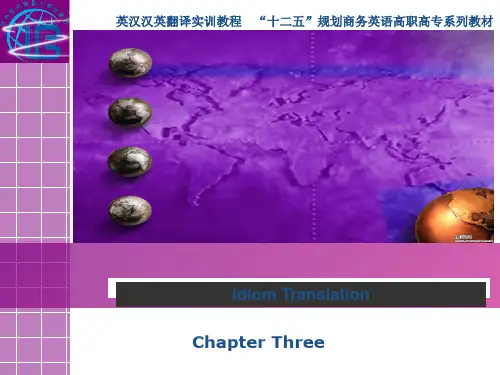
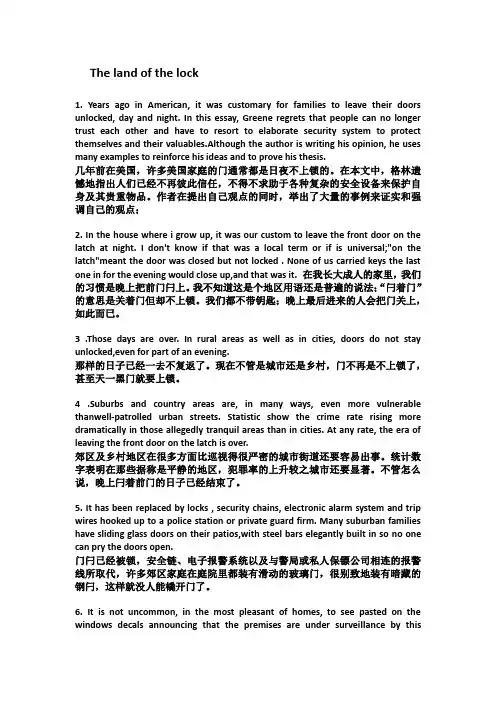
The land of the lock1. Years ago in American, it was customary for families to leave their doors unlocked, day and night. In this essay, Greene regrets that people can no longer trust each other and have to resort to elaborate security system to protect themselves and their valuables.Although the author is writing his opinion, he uses many examples to reinforce his ideas and to prove his thesis.几年前在美国,许多美国家庭的门通常都是日夜不上锁的。
在本文中,格林遗憾地指出人们已经不再彼此信任,不得不求助于各种复杂的安全设备来保护自身及其贵重物品。
作者在提出自己观点的同时,举出了大量的事例来证实和强调自己的观点;2. In the house where i grow up, it was our custom to leave the front door on the latch at night. I don't know if that was a local term or if is universal;"on the latch"meant the door was closed but not locked . None of us carried keys the last one in for the evening would close up,and that was it. 在我长大成人的家里,我们的习惯是晚上把前门闩上。

![[VIP专享]了不起的盖茨比第三章中英翻译The Great Gatsby Chapter 3](https://uimg.taocdn.com/43e3407c83c4bb4cf7ecd198.webp)
Chapter 3THERE was music from my neighbor's house through the summer nights. In his blue gardens men and girls came and went like moths among the whisperings and the champagne and the stars. At high tide in the afternoon I watched his guests diving from the tower of his raft, or taking the sun on the hot sand of his beach while his two motor−boats slit the waters of the Sound, drawing aquaplanes over cataracts of foam. On week−ends his Rolls−Royce became an omnibus, bearing parties to and from the city between nine in the morning and long past midnight, while his station wagon scampered like a brisk yellow bug to meet all trains. And on Mondays eight servants, including an extra gardener, toiled all day with mops and scrubbing−brushes and hammers and garden−shears,repairing the ravages of the night before.Every Friday five crates of oranges and lemons arrived from a fruitier in New York every Monday these same oranges and lemons left his back door in a pyramid of pulp less halves. There was a machine in the kitchen which could extract the juice of two hundred oranges in half an hour if a little button was pressed two hundred times by a butler's thumb.At least once a fortnight a corps of caterers came down with several hundred feet of canvas and enough colored lights to make a Christmas tree of Gatsby's enormous garden. On buffet tables, garnished with glistening hors−d'oeuvre,spiced baked hams crowded against salads of harlequin designs and pastry pigs and turkeys bewitched to a dark gold. In the main hall a bar with a real brass rail was set up, and stocked with gins and liquors and with cordials so long forgotten that most of his female guests were too young to know one from another.总是有悠扬的音乐在夏夜的晚上从我隔壁传出。
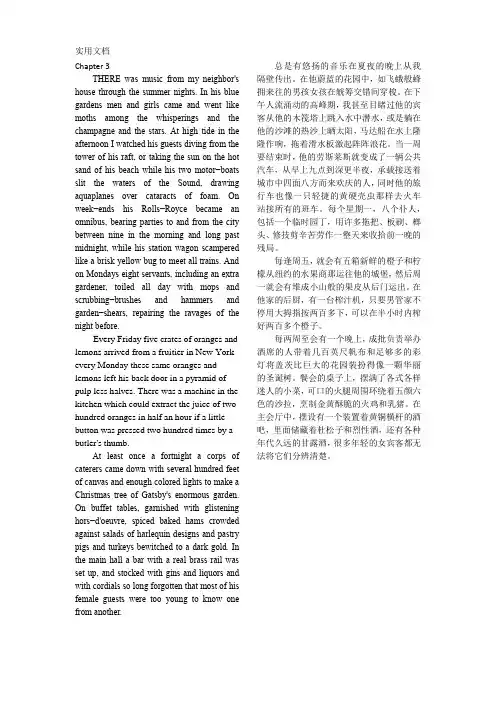
Chapter 3THERE was music from my neighbor's house through the summer nights. In his blue gardens men and girls came and went like moths among the whisperings and the champagne and the stars. At high tide in the afternoon I watched his guests diving from the tower of his raft, or taking the sun on the hot sand of his beach while his two motor−boats slit the waters of the Sound, drawing aquaplanes over cataracts of foam. On week−ends his Rolls−Royce became an omnibus, bearing parties to and from the city between nine in the morning and long past midnight, while his station wagon scampered like a brisk yellow bug to meet all trains. And on Mondays eight servants, including an extra gardener, toiled all day with mops and scrubbing−brushes and hammers and garden−shears, repairing the ravages of the night before.Every Friday five crates of oranges and lemons arrived from a fruitier in New York every Monday these same oranges and lemons left his back door in a pyramid of pulp less halves. There was a machine in the kitchen which could extract the juice of two hundred oranges in half an hour if a little button was pressed two hundred times by a butler's thumb.At least once a fortnight a corps of caterers came down with several hundred feet of canvas and enough colored lights to make a Christmas tree of Gatsby's enormous garden. On buffet tables, garnished with glistening hors−d'oeuvre, spiced baked hams crowded against salads of harlequin designs and pastry pigs and turkeys bewitched to a dark gold. In the main hall a bar with a real brass rail was set up, and stocked with gins and liquors and with cordials so long forgotten that most of his female guests were too young to know one from another.总是有悠扬的音乐在夏夜的晚上从我隔壁传出。
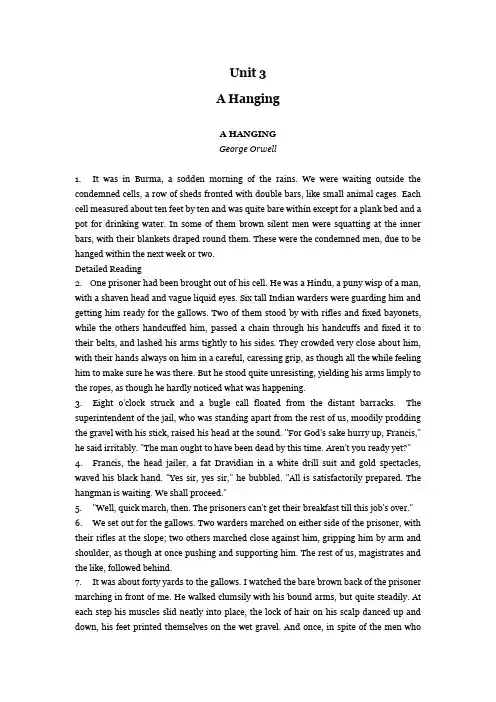
Unit 3A HangingA HANGINGGeorge Orwell1. It was in Burma, a sodden morning of the rains. We were waiting outside the condemned cells, a row of sheds fronted with double bars, like small animal cages. Each cell measured about ten feet by ten and was quite bare within except for a plank bed and a pot for drinking water. In some of them brown silent men were squatting at the inner bars, with their blankets draped round them. These were the condemned men, due to be hanged within the next week or two.Detailed Reading2. One prisoner had been brought out of his cell. He was a Hindu, a puny wisp of a man, with a shaven head and vague liquid eyes. Six tall Indian warders were guarding him and getting him ready for the gallows. Two of them stood by with rifles and fixed bayonets, while the others handcuffed him, passed a chain through his handcuffs and fixed it to their belts, and lashed his arms tightly to his sides. They crowded very close about him, with their hands always on him in a careful, caressing grip, as though all the while feeling him to make sure he was there. But he stood quite unresisting, yielding his arms limply to the ropes, as though he hardly noticed what was happening.3. Eight o'clock struck and a bugle call floated from the distant barracks. The superintendent of the jail, who was standing apart from the rest of us, moodily prodding the gravel with his stick, raised his head at the sound. "For God's sake hurry up, Francis," he said irritably. "The man ought to have been dead by this time. Aren't you ready yet?"4. Francis, the head jailer, a fat Dravidian in a white drill suit and gold spectacles, waved his black hand. "Yes sir, yes sir," he bubbled. "All is satisfactorily prepared. The hangman is waiting. We shall proceed."5. "Well, quick march, then. The prisoners can't get their breakfast till this job's over."6. We set out for the gallows. Two warders marched on either side of the prisoner, with their rifles at the slope; two others marched close against him, gripping him by arm and shoulder, as though at once pushing and supporting him. The rest of us, magistrates and the like, followed behind.7. It was about forty yards to the gallows. I watched the bare brown back of the prisoner marching in front of me. He walked clumsily with his bound arms, but quite steadily. At each step his muscles slid neatly into place, the lock of hair on his scalp danced up and down, his feet printed themselves on the wet gravel. And once, in spite of the men whogripped him by each shoulder, he stepped slightly aside to avoid a puddle on the path.8. It is curious, but till that moment I had never realized what it means to destroy a healthy, conscious man. When I saw the prisoner step aside to avoid the puddle I saw the mystery, the unspeakable wrongness, of cutting a life short when it is in full tide. This man was not dying, he was alive just as we are alive. All the organs of his body were working -- bowels digesting food, skin renewing itself, nails growing, tissues forming -- all toiling away in solemn foolery. His nails would still be growing when he stood on the drop, when he was falling through the air with a tenth of a second to live. His eyes saw the yellow gravel and the gray walls, and his brain still remembered, foresaw, reasoned -- reasoned even about puddles. He and we were a party of men walking together, seeing, hearing, feeling, understanding the same world; and in two minutes, with a sudden snap, one of us would be gone -- one mind less, one world less.9. The gallows stood in a small yard. The hangman, a gray-haired convict in the white uniform of the prison, was waiting beside his machine. He greeted us with a servile crouch as we entered. At a word from Francis the two warders, gripping the prisoner more closely than ever, half led half pushed him to the gallows and helped him clumsily up the ladder. Then the hangman climbed up and fixed the rope around the prisoner's neck.10. We stood waiting, five yards away. The warders had formed a rough circle round the gallows. And then, when the noose was fixed, the prisoner began crying out to his god. It was a high, reiterated cry of "Ram! Ram! Ram! Ram!" not urgent and fearful like a prayer or a cry for help, but steady, rhythmical, almost like the tolling of a bell.11. The hangman climbed down and stood ready, holding the lever. Minutes seemed to pass. The steady crying from the prisoner went on and on, "Ram! Ram! Ram!" never faltering for an instant. The superintendent, his head on his chest, was slowly poking the ground with his stick; perhaps he was counting the cries, allowing the prisoner a fixed number -- fifty, perhaps, or a hundred. Everyone had changed color. The Indians had gone gray like bad coffee, and one or two of the bayonets were wavering.12. Suddenly the superintendent made up his mind. Throwing up his head he made a swift motion with his stick. "Chalo!" he shouted almost fiercely.13. There was a clanking noise, and then dead silence. The prisoner had vanished, and the rope was twisting on itself. We went round the gallows to inspect the prisoner's body. He was dangling with his toes pointing straight downward. Very slowly revolving, as dead as a stone.14. The superintendent reached out with his stick and poked the bare brown body; it oscillated slightly. "He's all right," said the superintendent. He backed out from under the gallows, and blew out a deep breath. The moody look had gone out of his face quite suddenly. He glanced at his wrist watch. "Eight minutes past eight. Well, that's all for this morning, thank God."15. The warders unfixed bayonets and marched away. We walked out of the gallows yard, past the condemned cells with their waiting prisoners, into the big central yard of the prison. The convicts were already receiving their breakfast. They squatted in long rows, each man holding a tin pannikin, while two warders with buckets march round ladling out rice; it seemed quite a homely, jolly scene, after the hanging. An enormous relief had come upon us now that the job was done. One felt an impulse to sing, to break into a run, to snigger. All at once everyone began chattering gaily.16. The Eurasian boy walking beside me nodded toward the way we had come, with a knowing smile, "Do you know sir, our friend (he meant the dead man) when he heard his appeal had been dismissed, he pissed on the floor of his cell. From fright. Kindly take one of my cigarettes, sir. Do you not admire my new silver case, sir? Classy European style."17. Several people laughed -- at what, nobody seemed certain.18. Francis was walking by the superintendent, talking garrulously, "Well, sir, all has passed off with the utmost satisfactoriness. It was all finished -- flick! Like that. It is not always so -- oah no! I have known cases where the doctor was obliged to go beneath the gallows and pull the prisoner's legs to ensure decease. Most disagreeable."19. "Wriggling about, eh? That's bad," said the superintendent.20. "Ach, sir, it is worse when they become refractory! One man, I recall, clung to the bars of his cage when we went to take him out. You will scarcely credit, sir, that it took six warders to dislodge him, three pulling at each leg."21. I found that I was laughing quite loudly. Everyone was laughing. Even the superintendent grinned in a tolerant way. "You'd better all come and have a drink," he said quite genially. "I've got a bottle of whiskey in the car. We could do with it."22. We went through the big double gates of the prison into the road. "Pulling at his legs!" exclaimed a Burmese magistrate suddenly, and burst into a loud chuckling. We all began laughing again. At that moment Francis' anecdote seemed extraordinarily funny. We all had a drink together, native and European alike, quite amicably. The dead man was a hundred yards away.1. 那是发生在缅甸的事情。
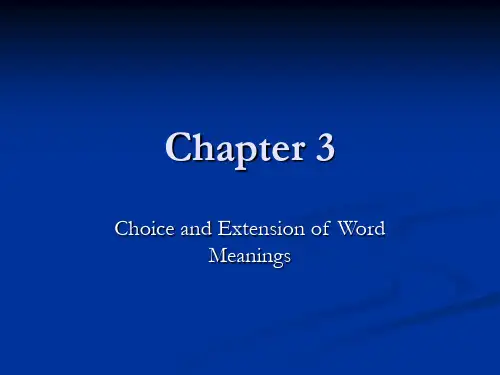
A New Chapter新的篇章The day I heard that the Rainbow Bookstore was closing after50 years of business, I was heartbroken. The bookstore, which was a legendary fixture in the neighbourhood, was a place where anyone could drop in and connect through their love of books.听说经营了50年的彩虹书店要停业的那天,我的心都要碎了。
这家书店是这片社区鼎鼎大名、永远不变的一家店,谁都可以来这里逛逛,因为热爱书籍而互相认识。
When I hurried to the store. I saw that the books were already being packed into boxes. I had a long chat with Casey, the stores elderly owner. Sighing deeply, he told me how becoming difficult to run an independent bookstore. Most people preferred reading e-books on tablets. More and more customers were being attracted by chain stores and online discounts. I tried to think of some words of sympathy, but I had to admit that the Rainbow Bookstore couldn't stay in businessmuch longer.我匆匆赶到书店,看到那些书已经装箱了。
第三册汉译英1发言人(spokesman)明确表示总统在任何情况下都不会取消(cancel)这次旅行。
The spokesman made it clear that the President would not cancel the trip under any circumstances.2我认为我们应该鼓励中学生在暑假找临时工作。
I think we should encourage high school students to find temporary jobs / employment during their summer holidays.3令我们吃惊的是,这位常被赞为十分正直的州长(governor)竟然是个贪官(corrupt official)。
To our surprise, the governor who had often been praised for his honesty turned out to be a corrupt official.4少数工人得到提升(be promoted),与此同时却有数百名工人被解雇。
A few workers were promoted, but meanwhile hundreds of workers were dismissed.5许多美国大学生申请政府贷款交付学费。
Many American students apply for government loans to pay for their education / tuition.6除阅读材料外,使用电影和多媒体(multimedia)会激发学生学习的兴趣。
Besides reading materials, the use of films and multimedia can stimulate students' interest in a subject.7我已经把我的简历(résumé)寄往几家公司,但尚未收到回复。
chapter 翻译基本解释●chapter:章节,篇章●/ˈtʃæptər/●n. 章节,篇章变化形式●复数形式:chapters具体用法●n.:o意思:章节,篇章o同义词:section, part, division, segment, portiono反义词:whole, entirety, total, aggregate, sumo例句:●The first chapter of the book introduces the main charactersand sets the scene for the story. (这本书的第一章介绍了主要人物并为故事设定了场景。
)●Each chapter in the textbook covers a different aspect of thesubject matter, providing a comprehensive understanding.(教科书中的每一章都涵盖了主题的不同方面,提供了全面的理解。
)●The final chapter of the novel brings all the plot threadstogether in a satisfying conclusion. (小说的最后一章将所有情节线索汇聚在一起,形成一个令人满意的结局。
)●In the history of the company, this year marks a new chapterwith the launch of innovative products. (在公司的历史中,今年标志着一个新篇章,推出了创新产品。
)●The chapter on climate change in the report highlights theurgent need for global action. (报告中关于气候变化的章节强调了全球行动的紧迫性。